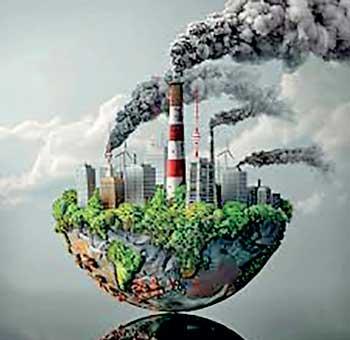Reply To:
Name - Reply Comment
 The Ceylon Chamber of Commerce emphasised this week the urgent need for local businesses to intensify their efforts in tackling issues related to climate change.
The Ceylon Chamber of Commerce emphasised this week the urgent need for local businesses to intensify their efforts in tackling issues related to climate change.
“It is high time that the business community in Sri Lanka pay attention to the consequences of not looking after our climate today,” Ceylon Chamber of Commerce Chairman Duminda Hulangamuwa said.
Changes in climate patterns are bringing about several hurdles for businesses, including high operational costs caused by global warming.
“The world is getting warmer and it is affecting all of us in a big way. I strongly believe that businesses should now take into account the issues of climate change. They should make sure that from the employees they have, to the customers they serve benefit from a sustainable environment,” Hulangamuwa said.
Addressing the launch of the Sri Lanka Climate Change Summit ‘Code Red’, he called upon local entities to utilise sustainable approaches for manufacturing products to conducting research.
Sri Lanka is one of the top ten countries affected by climate change.
Reflecting similar sentiments, Presidential Advisor in Environment, Climate Change and Green Finance Dr. Ananda Mallawatantri pointed out that there are several ways climate change is impacting businesses.
“All these add to the price, the raw material availability and then overall investment risk. When you are at a high risk like Sri Lanka, attracting investments need to be factored in. We see investors asking for climate insurance.
“Businesses need to take into account the changes taking place for them to be sustainable, Mallawatantri noted.
Mallawatantri ranked food security, agriculture and fisheries sectors among the most affected industries due to the
rise in temperature.
“The yield of any food crop tends to rise when the temperature increases. But at a certain level the yield curve starts bending. Unfortunately, some of our crops have reached this bending point,” Mallawatantri lamented.
Among cultivation of food crops, potato yields have been impacted due to the rise of minimum temperature required for cultivation in areas such as Nuwara Eliya.
Last year, the World Food Programme estimated 3.9 million people or 17 percent of the population in Sri Lanka are vulnerable to a moderate acute food insecurity.
Moreover, the rising costs of industries such as the livestock industry and the elevating sea levels in coastal areas, are increasingly reducing Sri Lanka’s competitiveness in the global market, Mallawatantri added. (NR)